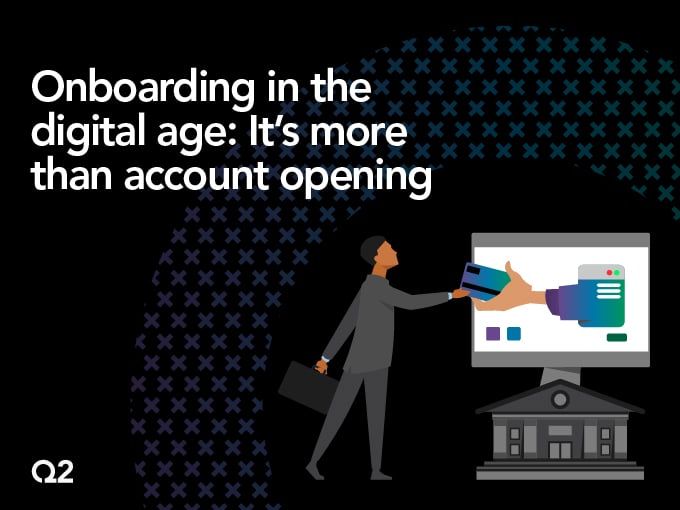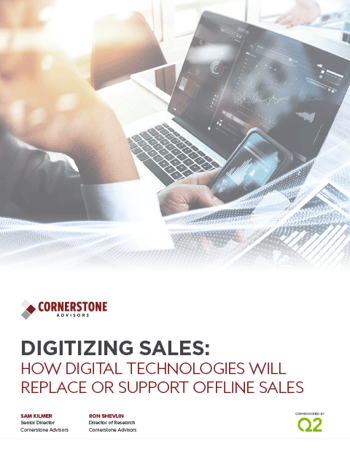Community FIs are now competing with big tech and with the massive, established brands that are increasingly offering financial services. It’s a tough landscape to gain new account holders in—meaning it’s more important than ever to make the most of the ones you already have. And, whenever possible, to begin building engagement from day one.
To their credit, FIs have made huge strides in adopting digital technology. But most aren’t making the most of the technology available to them—and they don’t have a fully realized digital strategy around onboarding.
The current model of onboarding is, for the most part, made up of three pieces:
• Winning/Acquiring – Successfully marketing to prospects isn’t easy, but it gets easier with data and with a fully digital process. Most consumers shop for FIs online these days. Clicking an obvious “sign up” button that’s been effectively targeted to their needs is how they begin banking relationships.
• Account Opening – In-branch visits should be optional at best. Branches shouldn’t even be mentioned in a digital workflow—it shouldn’t include any step or screen that isn’t necessary or that might slow the process down. If your account holders aren’t done with their end of the process in three to five minutes, something’s wrong. And their attention will likely waiver—as will their confidence in your ability to serve them in their preferred channels.
• Deposits/Payments – Your new account holders should immediately be able to make transactions—meaning they’ll need a virtual card. But to ensure long-term engagement, you really need to capture their recurring direct deposits. Where their money lives is where they’ll engage. This used to take a long time and require employer involvement, but this process can be automated now. All told, from initial application to switching their direct deposits to a new account, your new account holder should be done in ten minutes or less.
The above, combined with a given number of monthly transactions, is how primary banking relationships are commonly defined. But in the face of account holders who bank with multiple FIs, make payments on multiple non-FI apps, and have shrinking attention spans, those three steps aren’t enough. In the digital era, there’s more to building primary financial relationships.
The new primacy paradigm requires a bit more:
• Digital Engagement – Consumers’ digital lives, financial and otherwise, are expansive. They want someone to trust, they need advice and expertise—and they likely want it digitally. By offering tools for financial wellness, integrating with credit rating vendors, or allowing data from external accounts, you can benefit your customers and your FI. They’ll get a better, more holistic view of their finances and you’ll get a much richer understanding of their needs—including how you might be able to engage and serve them.
• Integrated Services – Keep in mind that the services and products you offer don’t have to be limited by what you’ve traditionally offered. It’s growing easier to integrate with third-party consumer applications. Some technology platforms offer an “app-store” marketplace experience that allows account holders to purchase and use financial software directly through their digital banking login. By offering these within your banking experience, you can bring consumers into your digital branch more often, keep them there longer, and become a deeply integral part of their financial lives.
• Long-Term Profitability – Every FI knows the dangers of slow, unsuccessful onboarding. Acquiring new account holders is costly. A significant ROI comes from deeper engagement, avoiding idle accounts, and successfully offering new services and products to consumers as need arises. A consumer that trusts and regularly engages with your FI for their financial wellness needs, savings goals, and other basics is more likely to seek you out when they need a mortgage, auto loan, or deeper advice.
All of this is just the beginning of the conversation. There are a lot of moving pieces to each of the above topics. And it takes, time, technology, and expertise to bring everything together. But the right approach can turn your consumer cost center into a revenue generator.
To learn more, download our eBook, “Onboarding in the Digital Age: Rethink Engagement to Win More Primary Banking Relationships." And, watch our recent onboarding webinar with industry influencer Jim Marous titled, "Keys to a Successful Digital Onboarding Process."

Onboarding in the Digital Age: It’s More than Account Opening
By Lee Willis
21 Jul, 2022

Written by Lee Willis
Lee Willis is responsible for product strategy and innovation programs in the account acquisition space, with a focus on enabling Q2 Gro clients to acquire, service, and expand relationships in an increasingly complicated landscape. Prior to Q2, Lee worked for a global consulting firm where he led large-scale projects and set the overall product strategy for several Fortune 500 companies. His product experience includes mobile app development, high volume payment processing, accounting, and billing.


